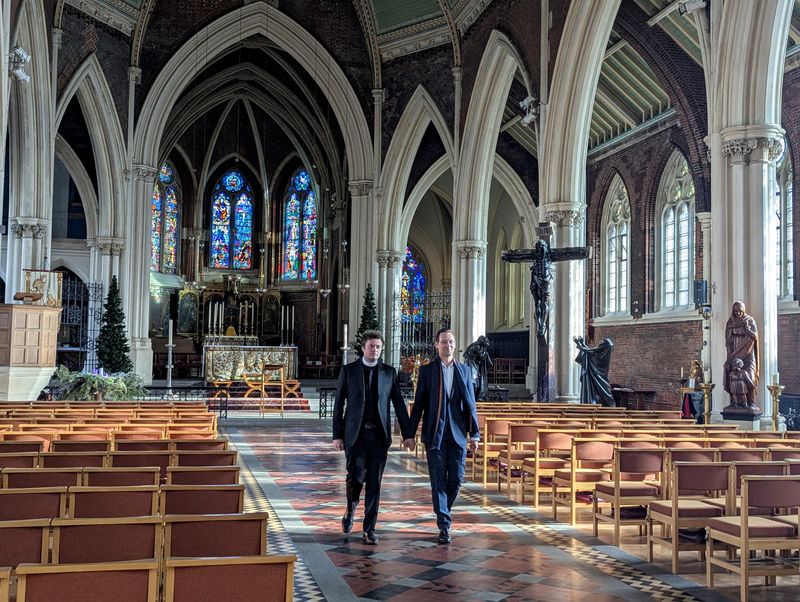Archbishop of Canterbury could scale back global role to avert Anglican schism

By Muvija M
LONDON (Reuters) -The Anglican Communion is exploring diluting the Archbishop of Canterbury’s role as its central symbolic leader, in an attempt to prevent internal divisions over ordination of women and inclusion of the LGBTQ+ community from tearing apart the world’s third-largest Christian faith.
For centuries, the man who crowns British monarchs as the seniormost bishop in the Church of England, which formed after Henry VIII’s 16th-century split from Rome, has also been the titular head of 85 million Anglicans across 165 countries.
But that headship, stemming from the British empire’s role in spreading Christianity to its former colonies, has been pushed to breaking point by splits over LGBTQ+ rights between England’s now more progressive church and the more traditional churches in Africa and Asia.
Forty-six different Churches make up the global Anglican Communion, with the Church of England considered the “mother church” to reflect its historical role.
To avert an all-out split, a representative body within the global Communion, which was asked to review its structure and decision-making processes, has proposed a rotating international figurehead, assuming some of the current organisational duties of the Archbishop of Canterbury, while they would focus on personal and pastoral ministry to the Communion.
The position could rotate between the Communion’s five global regions of Asia, Africa, the Americas, Europe and Oceania, with a term of six years.
Bishop Graham Tomlin, who led the work for the Inter-Anglican Standing Commission on Unity, Faith and Order (IASCUFO), told Reuters the existing structures needed to change.
“We are very different than we were 100 years ago,” he said.
The recommendations state a rotating figure “would add a welcome and overdue diversification”. Tomlin is hopeful that the proposals will be adopted at a 2026 gathering.
VACANT SEE OF CANTERBURY
The tension between progressive and traditional Christians is not unique to Anglicanism, but the CoE’s identity as a national church and Anglican mother church has forced a fundamental reset.
Unlike the Pope, who holds ultimate authority over 1.3 billion Catholics, the role of the Archbishop of Canterbury, a town considered one of the birthplaces of Christianity in Britain, is loosely defined and rooted in colonial-era deference.
“Some people think of the Pope as infallible; no one thinks the Archbishop of Canterbury is infallible,” Bishop Nick Baines told Reuters.
Sometimes, individual bishops have been heavily criticised, such as when then Archbishop Justin Welby was forced into an unprecedented resignation following calls to resign from within the CoE over a child abuse cover-up.
The office, dating back to 597, remains empty. Frontrunner Bishop Martyn Snow said recently he could not unify even the CoE on sexuality and marriage.
BATTLE FOR ANGLICAN IDENTITY
Divisions erupted in 2003 with the U.S. branch of the Anglican Church consecrating the first openly gay bishop, and deepened 12 years later when it allowed same-sex marriage rites, prompting sanctions from the Communion, whose doctrinal tone is shaped by the CoE.
The rift widened in 2023 when the conservative Global Anglican Future Conference (Gafcon) – claiming to represent 85% of Anglicans worldwide – rejected Welby’s leadership over the CoE’s own move to bless same-sex unions. It has rejected Tomlin’s proposals because it wants those churches willing to bless same-sex unions to leave the Communion.
“Gafcon is the Communion,” Archbishop Laurent Mbanda, Rwandan church leader and Gafcon Chairman, told Reuters. “Gafcon has never left the Communion and will not leave the Communion, but we let those who choose … to depart from the orthodox teaching, leave the Communion.”
Those who oppose same-sex relationships cite scripture as authoritative on sexual ethics, while others argue that ancient texts should not be applied directly to modern understandings of sexuality.
SHIFTING GRAVITY
The Communion’s centre has been shifting from Canterbury for decades, with its churches in Nigeria, Uganda, and Kenya together home to a third of all Anglicans, countries where homosexuality remains illegal.
While attendance at CoE churches has risen in the last four years, that follows decades of falls, and Linda Woodhead, head of theology at King’s College London, said the CoE had hurt its reputation in Britain by trying to preserve its historic global leadership.
“It’s not keeping the allegiance … of the population for which it’s meant to be the official established Church,” she said.
The CoE declined to comment on the suggested reforms as the selection of the 106th Archbishop is underway. The Anglican Communion Office said the proposals “would not take away” the Archbishop’s historic global role, but explore ways to share some responsibilities.
GAY CLERGY
The disconnect in the Communion is felt acutely by gay clergy like Charles Bączyk-Bell in London, who had to marry his partner in an Anglican church in New York, as the CoE stands by its teaching that marriage is between a man and woman.
He said he sometimes found it very difficult to hold together his identity with that of a CoE priest.
“There was a sense of sadness that we couldn’t do it around friends and family at home … it’s meant to be the day when you feel most at home,” he said.
Baines said the next Archbishop shouldn’t be fearful, given they will inherit a “broken Communion.” Bishop Joanne Grenfell supports a more collegiate model.
“I feel passionate about the Anglican Communion, but the role of Archbishop of Canterbury, that’s enormous,” Grenfell said.
“Perhaps a bit too big for one person.”
(Reporting by Muvija M; Additional reporting by Will Russell and Vitalii Yalahuzian in London, and Jean Baptiste Nkurunziza in Kigali;Editing by Kate Holton and Alexandra Hudson)









